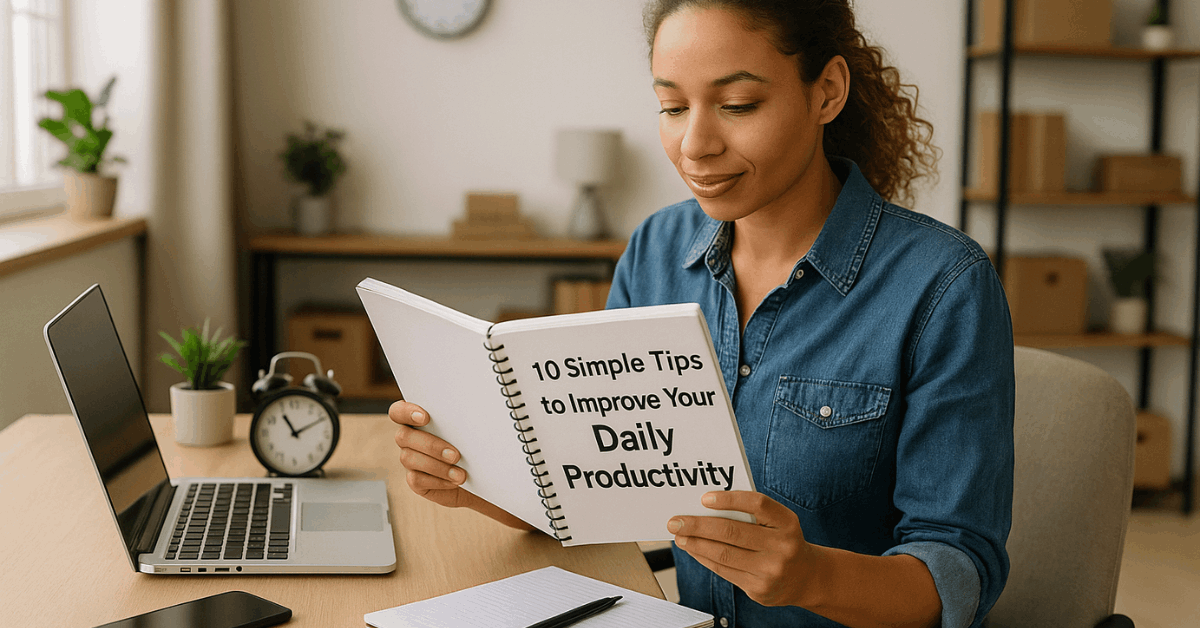Staying productive every day can be challenging, especially with constant distractions and unpredictable tasks. This article offers practical and easy-to-follow tips to enhance your daily productivity.
You don’t need expensive tools or complicated systems to stay focused. Just small, intentional changes can lead to noticeable progress.
Understanding What Slows You Down
Productivity often declines due to hidden patterns that go unnoticed. Common causes include procrastination, poor time management, and frequent multitasking.
Identifying these behaviors is crucial for making improvements. You also need to recognize physical and digital clutter that slows you down.
Lack of sleep, messy environments, and constant alerts all reduce your output. Addressing these issues helps you create a more focused and productive routine.

10 Simple Tips That Work
Improving your daily routine doesn’t require complex changes. These tips solve common productivity issues with quick, clear solutions.
1. Start Your Day with a Written Plan
Begin your day with clear priorities. Writing things down helps you stay on track and avoid distractions. Use a notebook or task app like Todoist or Microsoft To Do to outline your main tasks.
Keep your list short to prevent overwhelm. Focus on three major tasks each day. This gives you clarity and a sense of direction.
The more specific your plan, the more likely you are to stick with it. Revisit your list during the day to stay grounded.
2. Use the 80/20 Rule – Pareto Principle
Focus on the tasks that bring the biggest results. The 80/20 rule means 80% of your output often comes from 20% of your effort.
Identify the actions that yield the best return. Do those first. Avoid spending time on low-impact activities.
Ask yourself what really moves the needle forward. If something takes up time but doesn’t produce value, minimize it. This rule helps you work smarter.
3. Set Clear Time Limits for Tasks
Give yourself deadlines. Setting limits forces focus and reduces procrastination. Use a timer or schedule blocks in your calendar.
Working within time frames builds urgency. Break larger tasks into 30-minute or one-hour blocks. Taking small chunks helps reduce overwhelm.
When the timer ends, pause, review progress, then continue. This method keeps momentum going.
4. Eliminate or Mute All Distractions
Distractions destroy focus. Turn off notifications, put your phone away, and use browser blockers like StayFocusd or LeechBlock if needed.
Create a clean workspace to reduce visual clutter. Set a dedicated time for emails and messages. Avoid switching between tasks unnecessarily.
If possible, let others know when you’re not available. Your environment should support deep work.
5. Take Scheduled Breaks
Working nonstop leads to fatigue and errors. Schedule short breaks throughout your day. Try the Pomodoro method: 25 minutes of work followed by a 5-minute break using tools like Pomofocus or TomatoTimer.
Use break time to move, stretch, or grab water. Don’t use it for social media. Step away from your workspace to reset your focus. Breaks refresh your mind for the next task.
6. Do Your Most Important Task First
Start with your Most Important Task (MIT). Handle it before anything else distracts you. Morning energy is high, so use it on meaningful work. Avoid opening emails or social media first thing.
Focus only on the top priority. Completing it early gives you confidence for the rest of the day. One big win sets the tone.
7. Avoid Multitasking
Multitasking cuts productivity in half. Switching between tasks makes you slower and less accurate. Focus on one task until it’s finished. If a new task pops up, write it down and return to it later.
Resist the urge to check your phone or browser tabs. Deep work requires uninterrupted time. Single-tasking leads to better outcomes.
8. Keep a Clean and Organized Workspace
A messy desk creates mental clutter. Clear your desk before you start work. Keep only essential items in sight. Use trays, drawers, and folders to manage documents.
A tidy space increases focus and reduces decision fatigue. Tidy up again at the end of your day. It makes tomorrow’s start easier.
9. Use Tools and Apps That Help You Focus
Technology can support productivity when used wisely. Choose a few simple tools that match your workflow. Examples include Trello, Google Calendar, Focus Keeper, and Notion.
Avoid switching apps too often. Stick with what works and build routines around it. The right tools simplify tracking and reduce manual effort. Let technology serve your process—not control it.
10. Reflect on Your Day Before Bed
End your day with reflection. Ask what went well and what didn’t. Write down what you learned or could improve. Use a simple journal or an app like Day One or Journey for tracking.
This habit sharpens self-awareness and builds consistency. It also helps you adjust your routine as needed. Progress comes from review, not just action.

Build Habits Around the Tips
Applying tips once isn’t enough—you need habits. Productivity improves when actions become automatic. Start with just two tips, then add more after a week.
Use reminders, sticky notes, or habit-tracking apps like Habitica or Streaks. Reward yourself when you stick to a habit. Consistency beats intensity. Long-term gains come from daily effort.
Track Your Progress Without Overthinking It
Tracking productivity doesn’t have to be complicated. Use a basic checklist or weekly planner like TickTick or Any.do to mark tasks as complete. Review your progress at the end of each week to see what worked.
Adjust your approach based on what you learn. Keep your method flexible so it fits your lifestyle. The goal is to stay consistent without getting overwhelmed.
When to Adjust Your Routine?
Your productivity system needs to match your lifestyle and energy levels. If you’re constantly overwhelmed or missing targets, it’s time to revise your routine.
Watch for when your focus drops or fatigue sets in. This might mean reducing task volume or increasing short breaks.
Don’t stick to a system that no longer serves you. Effective productivity means being flexible and adjusting as needed.
Tools Vs. Discipline
Discipline matters more than any productivity tool you can use. A sleek app cannot replace strong personal habits built through routine.
Use tools to support your system, but never depend entirely on them. Discipline means showing up even when motivation is low or absent.
That consistency is what makes people truly productive. Focus on building reliable habits before adding technology.
Conclusion: Apply and Keep Going
Boosting your productivity doesn’t require a full lifestyle change. This article provides 10 proven tips to enhance your daily productivity and demonstrates how to establish lasting habits.
Focus on one change at a time and track your growth. Stick with it, and the results will come.












